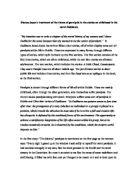The character of Father Flynn possesses a didactic role over the young boy, and we are told ‘he taught [him] a great deal’. Whether this teaching was desired by or imposed upon the narrator is not made clear but it is apparent that the priest instilled a certain amount of trepidation and awe, as well as admiration, in the boy, due to the adjectives used to describe his appearance, ‘ancient’, ‘truculent, grey and massive, with black cavernous nostrils.’ The priest’s description is symbolic of the way in which the narrator feels about religion; one of the main roles that the encounter with the elder generation plays. The colours described are dark and intimidating, the atmosphere in his room was smoke-filled and one of lethargy, just as religion would have seemed harsh, restrictive and uninspiring. The man in ‘An Encounter’, also representing religion does not give a good impression of this central aspect of Irish society, he is perverted and contradictory in his words, ‘he seemed to have forgotten his recent liberalism…he would whip a boy… he would love that.’ One role of this encounter is to demonstrate the confusion that the boy feels about religion, before his eyes he sees contradiction in a religious figure, perverted and unnerving contradiction at that, which can only serve to add yet more doubt to his wavering faith.
In both scenarios the narrator feels relieved when he escapes his elders whom he finds unnerving, indeed the epiphany in ‘Sisters’ is the moment where he realises that he feels ‘a sensation of freedom…by his death.’ In the same way in ‘An Encounter’ the boy seizes the first available moment to escape from the strange man, ‘I stood up abruptly…saying that I was obliged to go.’ There is an urgency to get away from these mysterious characters although this is not apparent to the boy in the context of Father Flynn until he is involuntarily released by his death.
Strangely, in the two stories the child feels an affinity to the elder generation and thus there is a sense of guilt due to the relief he experiences when they are absent. In ‘Sisters’ the boy definitely admires the priest and despite feeling entrapped and paralysed by the religious implications attached to his role in society, there is also a certain empathy he feels towards him. ‘The duties of the priesthood were too much for [Father Flynn]’ and ‘smothered’ him, just as the requirements the boy must conform to in terms of religion are too demanding on his confused and inquisitive mind. In ‘An Encounter’ the sense of empathy appears at the epiphany of the story, where the narrator realises that, like the man, he had ‘always despised [Mahony] a little.’ This sudden, unexpected revelation that has been brought about by the unsettling words of the man demonstrates that the role of the older generation in this scenario has been to help the boy be true to himself and admit his own beliefs, which may inadvertently help him to accept his true religious feelings.
The language and sentence structure used in ‘Sisters’ helps to emphasise the generation gap perceived by the reader, words such as ‘endless’ which imply the length of Old Cotter’s life as well as his boring talk, the threatening words that indicate the unapproachable appearance of Father Flynn due to his age and social significance, ‘blackened’, ‘solemn and copious’. Where the narrator describes how Father Flynn impressed his knowledge upon him, he lists the topics that he was taught, which shows not only the amount of subjects the two covered, but also symbolises the sheer length and content of the priest’s long life.
The encounters used by Joyce in these two stories play conflicting roles, and contradiction is evident even within the same story; the boy describes a sense of anxiety to escape from his elders, yet expresses guilt at these feelings. He feels trapped by religion, yet sympathises with a priest about the constraints it makes on society, surprising as such a figure should be the embodiment of the restriction he finds it hard to abide by. The distance expressed both in terms of age and in opinion shows how the boy feels controlled by a generation he cannot relate to. This conveys a sense of paralysis affecting the younger generation of Ireland, a generation controlled by its elders and their religion, a religion which controls rather than directs its pupils. The encounters that make up such an important part of the two stories serve to demonstrate the alienation the children of Ireland feel towards their elders and their social situation: there simply is not the same strength of feeling towards religion in their lives, an empowering force on their lives and in Dublin.






